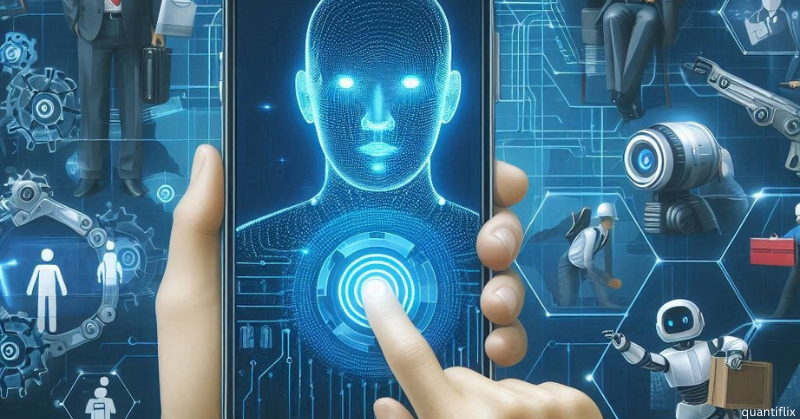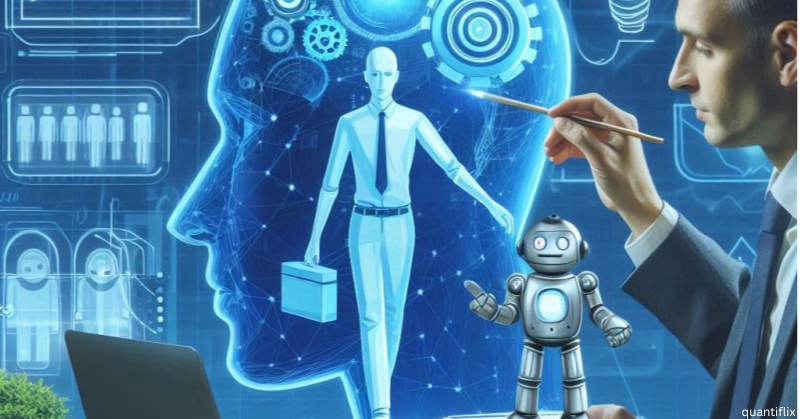We all know that with the arrival of AI, our lives and work have changed significantly. In some ways, life has become simpler, while in others, it has grown more complex. A global survey indicates that the impact of AI will lead to an increase in jobs. According to one website, 85% of companies agree that AI will positively influence the job market. Let’s check some positive and negative impact of AI on future jobs.
Last December, Paytm laid off 1,000 employees from its sales, operations, and engineering departments, stating that AI-powered automation would help the company save 10-15% in costs. In our daily lives, we have grown accustomed to using AI. Another survey reported that ‘almost 30% of professionals’ have tried ChatGPT at work. Meanwhile, a LinkedIn survey revealed that 8 out of 10 professionals agree that AI will significantly impact their jobs. People increasingly want to use AI tools to search for information, seek advice, or solve problems easily.
Negative Impact of AI on Future Jobs
There is a high chance of a decrease in jobs and an increase in automation. As AI technologies become more advanced every day, they are increasingly capable of performing repetitive tasks. As a result, industries across the board are adopting automation tools to simplify operations. Along with industrial production and the automobile sector, jobs like data entry, customer service, and analysis are at risk due to AI.

For example, chatbots and virtual assistants can easily handle customer queries, and they are already doing so. Human involvement has significantly decreased, leading to growing insecurity about unemployment and family income. This was one of the reasons behind the 2023 ‘Hollywood vs. AI’ strike, where writers ended their strike as studios promised protections against AI.
Last year, 11,000 writers went on strike, claiming that production houses and studios would rely on AI, putting their jobs at risk. Members of the Writers Guild of America were a major part of the strike. Hollywood A-list actors such as Tom Cruise, Angelina Jolie, Meryl Streep, and Johnny Depp supported it. The writers ended their 148-day strike with trust that artists would receive fair pay compared to AI and technology, and that job industries would not be threatened by AI.
Not all industries will be affected equally by AI. There is a rise in job inequality due to fluctuations in various sectors. Industries that rely heavily on manual labor or independent tasks are being hit hardest by AI. When it comes to automation, machines often have the upper hand.
Researchers Survey: Oxford University
Researchers from Oxford University published a survey titled ‘When Will AI Exceed Human Performance.’ The survey predicted that by 2026, AI-driven machines will write school essays, and by 2027, driver jobs will be replaced by self-driving trucks. With the rise of AI and automation, there has been an increased demand for new skill sets in the market, leading to a rise in the demand for analytical and technical jobs. However, there is also a risk of job loss.

In comparison to the US, UK, and Germany, Indians believe there is a higher chance of losing jobs to AI. This is due to the large BPO and KPO sectors and the rapid adoption of advanced technologies. Additionally, the Indian tech market is at greater risk, especially after 2022, as the rise of tools like ChatGPT has made it more challenging to work in tech industries
Impact of AI like Google Bard & Bing AI
With the launch of Google Bard and Bing AI, many companies have benefited from AI, which was one of the reasons 4,000 employees lost their jobs in 2023. The highly animated graphics we see on social media are largely driven by AI. You can generate AI images through Microsoft Bing simply by providing a prompt. Jobs like graphic designers, video editors, and sketch artists are already at risk.
On the other hand, AI lacks a sense of responsibility and sensitivity. AI image generators, like those in Windows Paint and Microsoft Bing, have created highly realistic images of Joe Biden and Hillary Clinton, raising concerns about the ethical use and safety of such tools. In the near future, AI could significantly impact industries such as automotive, healthcare, retail, and consumer packaged goods (CPG).
A recent article highlighted an example where a client discovered that his employees were using ChatGPT to write high-quality articles. As a result, the client started using ChatGPT himself, putting the writer’s job at risk. The writer, who used to charge $5,000 per article, was forced to change roles due to this shift. While technology often brings challenges, it also creates new opportunities.
Positive Impact of AI on Future Jobs
With the rise of e-rickshaws, traditional paddle rickshaws are becoming less common, and drones are reducing the need for helicopter-based shooting. We need to adapt and upgrade ourselves with the help of technology. The same is true with AI. While AI introduces new tools, it also creates job opportunities in fields such as data engineering, data analysis, big data engineering, machine learning, robotics, research, product management, business intelligence development, implementation engineering, and software development.

According to ServiceNow, AI development has led to the creation of 4.7 million new jobs. In the next five years, approximately 16 million workers will need to upgrade their skills to keep up with technological advancements. However, the rise of AI has also caused job losses in various industries. Here’s a breakdown of the percentage of job loss in different sectors:
| Industry | Job Loss (%) |
|---|---|
| Manufacturing | 23% |
| Agriculture and Fishing | 22% |
| Wholesale & Retail | 11.6% |
| Transportation & Storage | 8% |
| Construction | 7.8% |
By 2027, we will see an increase in various tech jobs, including 75,000 software application developers, 72,000 system software developers, 71,000 data engineers, 70,000 data analysts, and 69,000 data integration analysts. Additionally, roles such as data scientists, machine learning specialists, cloud engineers, and full-stack developers will remain in high demand across both tech and non-tech sectors. Instead of the current 765,000 tech jobs, we expect to create 1,115,000 jobs by 2027.
Benefit Of AI-Powered tools
For instance, aren’t we using ChatGPT in our daily lives? Whether it’s crafting a resume or creating a portfolio, we benefit from ChatGPT in many ways. We use it to write articles in a professional format and to strategize for UPSC preparation. We also seek guidance on starting and growing a YouTube channel.
Indian writers can enhance their skills with ChatGPT. It helps with SEO keyword research, provides fillers for fiction writing, and assists in proofreading. In all these areas, ChatGPT proves to be very helpful. Additionally, AI-powered tools like Grammarly simplify tasks like sending emails and writing business proposals.
With AI, the Indian education system will see a rise of 10% in jobs, potentially creating 3 million new positions. Additionally, there is a predicted increase of 15-20% in jobs within the agriculture sector. We have also observed a revolution in healthcare due to AI, which aids in identifying diseases and developing advanced treatments. AI plays a significant role in research and development, vaccine creation, and managing thousands or even millions of data points in medical science.
In the finance sector, AI has improved fraud detection by 70%, which is a key reason for the high demand for skilled data engineers. Overall, AI has a positive impact across various aspects of the industry.
Solutions
Although AI has helped us in numerous ways, we now need to improve our skills for better results and personal growth.
- Decision Making Skills
- Leadership Skills
- Innovative and Creative
If a writer learns how to use ChatGPT, it can significantly improve their productivity. We need to become AI-friendly and develop skills for AI-driven job roles. This is the only way to secure jobs and maintain sustainability.



